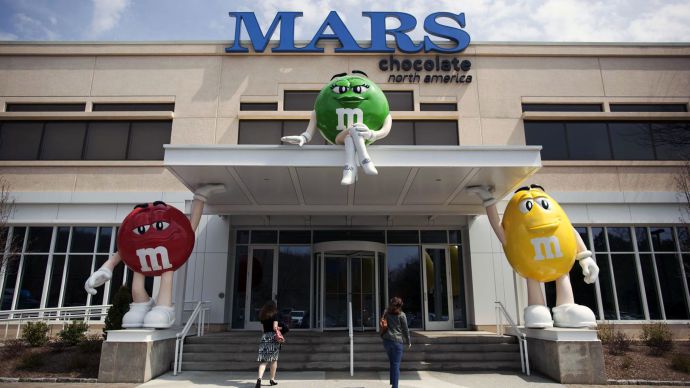Friday, 27/02/2026 | 14:08 GMT+7
That power surge was driven by the construction of Mesquite Creek Wind farm in Texas, a 118-turbine project that provides the equivalent of 12% of Mars’ global energy.
The uptick in renewable power was matched by a small increase in energy efficiency, as total energy consumption fell by 2% across the company in 2014.
Mars, which generates more than $33bn in global sales, credited a variety of regional initiatives and investments in new technology for the improvement.
For example, a Mars Chocolate factory in France, started using steam generated from a nearby waste energy facility to meet 90% of the site’s heating needs.
Likewise, a Mars Chocolate plant in Germany, found a way to recover waste heat from the site cooling system using a heat pump, conserving water and reducing steam consumption.
The company, which also produces Wrigleys gum, Pedigree dog food and Uncle Ben’s rice, claims its energy saving measures have reduced operating costs by approximately 10% from a 2007 baseline.

The initiatives are part of Mars’ Sustainable in a Generation plan, which aims to make the company completely fossil-fuel free by 2040.
Long-term targets for water and waste have not yet been defined, but the company has 2015 targets to send zero waste to landfill and reduce its water use by 25% from a 2007 baseline.
So far, 79% of Mars sites send zero waste to landfill, while water use is down 15% from 2007.
The sustainability report said: “What we have learned from implementing our 2015 targets will help us set, and achieve, our future goals.
“For example, while some of our sites have become more energy efficient, others have struggled. To get all our sites on track, we created a playbook to communicate learnings from successful sites to encourage innovation.”
Mars is also a member of the RE100 renewable energy commitment, and recently signed an open letter to David Cameron urging him to tackle climate change and support a low-carbon UK economy.
Mai Linh








 Consultation on the methodology for developing and updating energy consumption standards for four major industrial sectors
Consultation on the methodology for developing and updating energy consumption standards for four major industrial sectors
 Opening of the 2025 Energy-Efficient Equipment and Green Transition Exhibition Fair
Opening of the 2025 Energy-Efficient Equipment and Green Transition Exhibition Fair
 Energy-saving solutions and green transition promotion
Energy-saving solutions and green transition promotion
 The 9th VEPG Steering Committee Meeting: Strengthening Coordination for Viet Nam’s Just Energy Transition
The 9th VEPG Steering Committee Meeting: Strengthening Coordination for Viet Nam’s Just Energy Transition